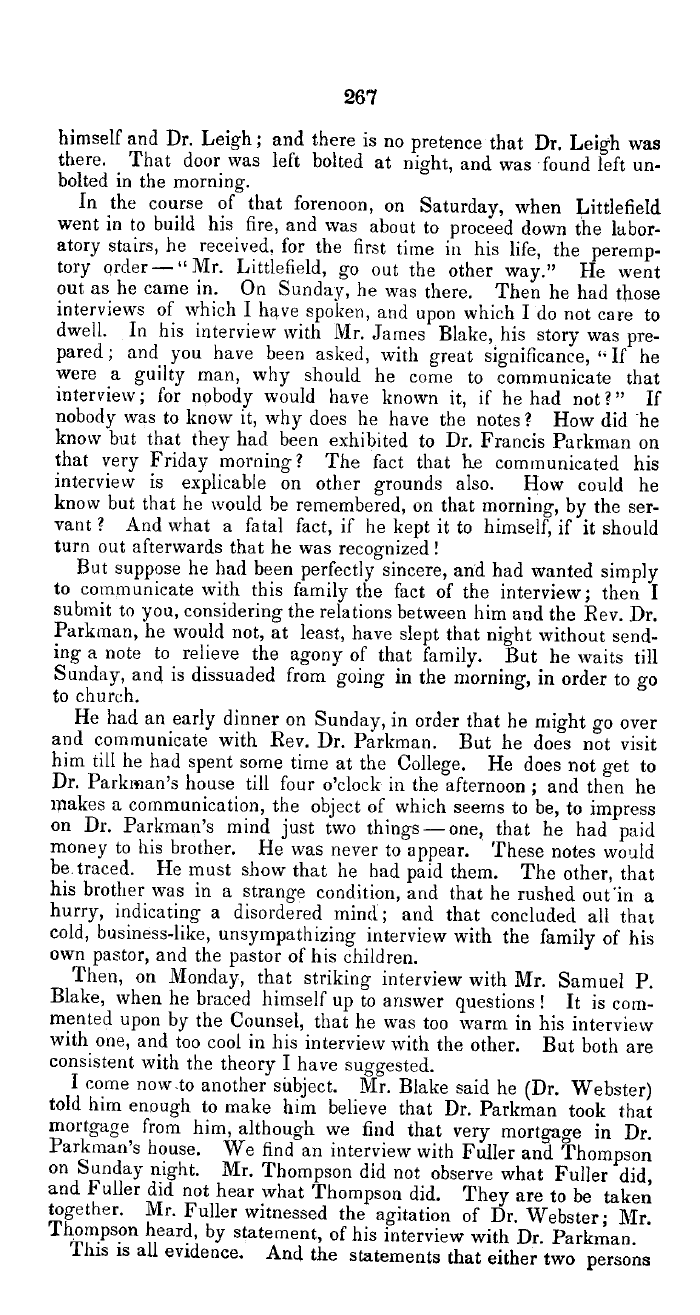|
267
himself and Dr. Leigh; and there is no pretence that Dr. Leigh was
there. That door was left bolted at night, and was found left un-
bolted in the morning.
In the course of that forenoon, on Saturday, when Littlefield
went in to build his fire, and was about to proceed down the labor-
atory stairs, he received. for the first time in his life, the peremp-
tory order-Mr. Littlefield, go out the other way." He went
out as he came in. On Sunday, he was there. Then he had those
interviews of which I have spoken, and upon which I do not care to
dwell. In his interview with Mr. James Blake, his story was pre-
pared; and you have been asked, with great significance, °v If he
were a guilty man, why should he come to communicate that
interview; for nobody would have known it, if he had not?" If
nobody was to know it, why does he have the notes? How did he
know but that they had been exhibited to Dr. Francis Parkman on
that very Friday morning? The fact that he communicated his
interview is explicable on other grounds also. How could he
know but that he would be remembered, on that morning, by the ser-
vant ? And what a fatal fact, if he kept it to himself, if it should
turn out afterwards that he was recognized
But suppose he had been perfectly sincere, arid had wanted simply
to communicate with this family the fact of the interview; then I
submit to you, considering the relations between him and the Rev. Dr.
Parkman, he would riot, at least, have slept that night without send-
ing a note to relieve the agony of that family. But he waits till
Sunday, and is dissuaded from going in the morning, in order to go
to church.
He had an early dinner on Sunday, in order that he might go over
and communicate with Rev. Dr. Parkman. But he does not visit
him till he had spent some time at the College. He does not get to
Dr. Parkman's house till four o'clock in the afternoon ; and then he
makes a communication, the object of which seems to be, to impress
on Dr. Parkman's mind just two things-one, that he had paid
money to his brother. He was never to appear. These notes would
be.traced. He must show that he had paid them. The other, that
his brother was in a strange condition, and that he rushed out'in a
hurry, indicating a disordered mind; and that concluded all that
cold, business-like, unsympathizing interview with the family of his
own pastor, and the pastor of his children.
Then, on Monday, that striking interview with Mr. Samuel P.
Blake, when he braced himself up to answer questions ! It is com-
mented upon by the Counsel, that he was too warm in his interview
with one, and too cool in his interview with the other. But both are
consistent with the theory I have suggested.
I come now.to another subject. Mr. Blake said he (Dr. Webster)
told him enough to make him believe that Dr. Parkman took that
mortgage from him, although we find that very mortgage in Dr.
Parkma.u's house. We find an interview with Fuller and Thompson
on Sunday night. Mr. Thompson did not observe what Fuller did,
and Fuller did not hear what Thompson did. They are to be taken
together. Mr. Fuller witnessed the agitation of Dr. Webster; Mr.
Thompson heard by statement, of his interview with Dr. Parkman.
This is all evidence. And the statements that either two persons
|

